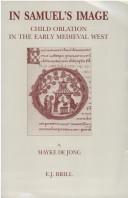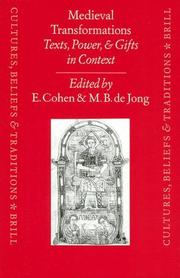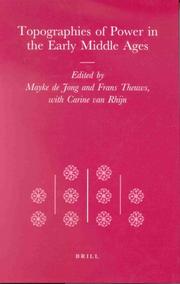| Listing 1 - 9 of 9 |
Sort by
|

ISSN: 09208607 ISBN: 9004104836 9004246614 9789004104839 Year: 1996 Volume: 12 Publisher: Leiden, Netherlands,New York : E.J. Brill,
Abstract | Keywords | Export | Availability | Bookmark
 Loading...
Loading...Choose an application
- Reference Manager
- EndNote
- RefWorks (Direct export to RefWorks)
Early medieval religious communities were filled with monks and nuns who spent almost their entire lives within the monastic confines. Many had arrived in childhood, through an irrevocable act of parental sacrifice (oblatio). According to Benedict's Rule, parents were to donate their sons “to God in the monastery”, following the biblical example of Hannah offering her son Samuel at the Temple. From the twelfth century onwards, this once widespread practice became increasingly controversial. Why did parents give away their children? Were they driven by economic necessity? This book argues that child oblation was anything but a religious disguise for abandoning superfluous offspring. Instead, it was a sacrifice, and should be viewed within the context of gift-giving, religious and otherwise, which assumed such a central importance in early medieval societies.
Monasticism and religious orders --- Monachisme et ordres religieux --- Brothers --- Religieux --- Europe --- Church history --- Histoire religieuse --- Child oblates --- History --- History. --- -Church history --- -Christianity --- Ecclesiastical history --- History, Church --- History, Ecclesiastical --- Christianity --- Child oblation (Monasticism) --- Oblates, Child --- Council of Europe countries --- Eastern Hemisphere --- Eurasia --- -Child oblates --- -History --- -Brothers (Religious) --- Brothers (Religious) --- Middle Ages, 600-1500 --- 600-1500. --- 600-1500 --- Child oblates - Europe - History. --- Middle Ages, 500-1500 --- Child oblates - Europe - History --- Church history - Middle Ages, 600-1500 --- Europe - Church history - 600-1500.
Book
ISBN: 9780521881524 Year: 2009 Publisher: Cambridge New York : Melbourne : Cambridge University Press,
Abstract | Keywords | Export | Availability | Bookmark
 Loading...
Loading...Choose an application
- Reference Manager
- EndNote
- RefWorks (Direct export to RefWorks)
Repentance --- Atonement --- Monarchy --- Church and state --- Repentir --- Rachat (Théologie) --- Monarchie --- Eglise et Etat --- Political aspects --- History --- Aspect politique --- Histoire --- Louis --- Religion. --- France --- Kings and rulers --- Biography. --- Sources. --- Church history --- Religious aspects. --- Rois et souverains --- Biographies --- Sources --- Histoire religieuse --- Aspect religieux --- Rachat (Théologie) --- Attrition --- Contrition --- Penitence --- Sin --- Penance --- Kingdom (Monarchy) --- Executive power --- Political science --- Royalists --- Christianity and state --- Separation of church and state --- State and church --- State, The --- Redemption --- Sacrifice --- Hludowic --- Ludwig --- Louis, --- Ludwig, --- Pʻŭrangsŭ --- Frankrig --- Francja --- Frant︠s︡ii︠a︡ --- Prantsusmaa --- Francia (Republic) --- Tsarfat --- Tsorfat --- Franḳraykh --- Frankreich --- Fa-kuo --- Faguo --- Франция --- French Republic --- République française --- Peurancih --- Frankryk --- Franse Republiek --- Francland --- Frencisc Cynewīse --- فرنسا --- Faransā --- Franza --- Republica Franzesa --- Gallia (Republic) --- Hyãsia --- Phransiya --- Fransa --- Fransa Respublikası --- Franse --- Францыя --- Frantsyi︠a︡ --- Французская Рэспубліка --- Frantsuzskai︠a︡ Rėspublika --- Parancis --- Pransya --- Franis --- Francuska --- Republika Francuska --- Bro-C'hall --- Френска република --- Frenska republika --- França --- República Francesa --- Pransiya --- Republikang Pranses --- Γαλλία --- Gallia --- Γαλλική Δημοκρατία --- Gallikē Dēmokratia --- فرانسه --- Farānsah --- צרפת --- רפובליקה הצרפתית --- Republiḳah ha-Tsarfatit --- פראנקרייך --- 法国 --- 法蘭西共和國 --- Falanxi Gongheguo --- フランス --- Furansu --- フランス共和国 --- Furansu Kyōwakoku --- Francija --- Ranska --- Frankrike --- France (Provisional government, 1944-1946) --- 프랑스 --- Falanxi --- Fa-lan-hsi --- 法蘭西 --- Frankrijk --- Frant︠s︡ --- Франц --- Frant︠s︡ Uls --- Франц Улс --- Louis I (empereur d'Occident ; 0778-0840) --- Pénitence --- Église et État --- Empire carolingien --- Religion --- 9e siècle --- Politique et gouvernement --- 814-840 (Louis Ier)
Article
Abstract | Keywords | Export | Availability | Bookmark
 Loading...
Loading...Choose an application
- Reference Manager
- EndNote
- RefWorks (Direct export to RefWorks)

ISSN: 13825364 ISBN: 9004117288 9004476407 9789004117280 9789004476400 Year: 2001 Volume: 11 Publisher: Leiden; Boston : BRILL
Abstract | Keywords | Export | Availability | Bookmark
 Loading...
Loading...Choose an application
- Reference Manager
- EndNote
- RefWorks (Direct export to RefWorks)
This volume deals with shifts and changes that took place during the Middle Ages when things, or ideas, or writings, were transferred from time to time, place to place, or one ideological realm to another. The same objects, ideas, or texts changed their meaning, impact, or symbolic value according to different contexts. The twelve papers, written by leading experts, investigate the authority attributed to texts and their canonization in different contexts; the shifting uses and meanings of gifts, from honorable instruments in the settlement of disputes to corruption and bribery; and the transition of violence and power from relationships between equals to a tool for the maintenance of hierarchies. Contributors include: Gadi Algazi, Monique Bernards, Arnoud-Jan Bijsterveld, Esther Cohen, Valentin Groebner, Yitzhak Hen, Mayke de Jong, Rob Meens, Marco Mostert, Thomas F.X. Noble, Timothy Reuter, Hendrik Teunis, and Stephen D. White.
Middle Ages --- Civilization, Medieval --- Sacred books --- History --- 930.85.42 --- 09 <063> --- 316.77 <09> --- -Sacred books --- -Books, Sacred --- Sacred literatures --- Religious literature --- Dark Ages --- History, Medieval --- Medieval history --- Medieval period --- World history, Medieval --- World history --- Medievalism --- Renaissance --- Medieval civilization --- Civilization --- Chivalry --- Cultuurgeschiedenis: Middeleeuwen --- Handschriften. Oude en merkwaardige drukken. Curiosa--Congressen --- Communicatiesociologie--Geschiedenis van ... --- -Cultuurgeschiedenis: Middeleeuwen --- 316.77 <09> Communicatiesociologie--Geschiedenis van ... --- 09 <063> Handschriften. Oude en merkwaardige drukken. Curiosa--Congressen --- 930.85.42 Cultuurgeschiedenis: Middeleeuwen --- -Civilization, Medieval --- Books, Sacred --- Communicatiesociologie--Geschiedenis van .. --- Communicatiesociologie--Geschiedenis van --- Middle Ages - History - Congresses. --- Civilization, Medieval - Congresses --- Sacred books - History - Congresses.
Book
ISBN: 9781526134844 9781526134820 1526134845 1526134829 Year: 2020 Publisher: Manchester : Manchester University Press,
Abstract | Keywords | Export | Availability | Bookmark
 Loading...
Loading...Choose an application
- Reference Manager
- EndNote
- RefWorks (Direct export to RefWorks)
La 4e de couv. indique : "This book presents a new translation of the 'Epitaph for Arsenius' by Paschasius Radbertus (Radbert), a monk of Corbie. A daring defence of Charlemagne's cousin Wala, onetime abbot of Corbie, the 'Epitaph' is about ideals of religious and political leadership, articulated by an author who was an actor in his own narrative. To newcomers and seasoned scholars alike, Radbert offers a fascinating window onto a rapidly changing Carolingian world. Nicknamed 'Arsenius' by his monks, after a late-antique monastic pioneer, Wala played a leading part in the two rebellions against Louis the Pious, Charlemagne's son and successor, in 830-3, before dying in exile in 836. In a now-hostile political climate, Radbert set about repairing Wala's damaged reputation, arguing that his abbot had not been unfaithful to the emperor. He did so in the form of a spirited conversation between himself and several fellow monks, who recall the deeds and motives of their beloved abbot. Radbert's Epitaph deserves to be better known, and should become a major resource as a teaching text on Carolingian politics. Mayke de Jong and Justin Lake, renowned scholars of Carolingian history and Latin philology, make the challenging Latin original accessible to both students and specialists. They also provide a comprehensive commentary and footnotes dealing with the historical and intellectual context and language, which are important contributions to scholarship in their own right."
Wala, --- France --- Bro-C'hall --- Fa-kuo --- Fa-lan-hsi --- Faguo --- Falanxi --- Falanxi Gongheguo --- Faransā --- Farānsah --- França --- Francia (Republic) --- Francija --- Francja --- Francland --- Francuska --- Franis --- Franḳraykh --- Frankreich --- Frankrig --- Frankrijk --- Frankrike --- Frankryk --- Fransa --- Fransa Respublikası --- Franse --- Franse Republiek --- Frant︠s︡ --- Frant︠s︡ Uls --- Frant︠s︡ii︠a︡ --- Frantsuzskai︠a︡ Rėspublika --- Frantsyi︠a︡ --- Franza --- French Republic --- Frencisc Cynewīse --- Frenska republika --- Furansu --- Furansu Kyōwakoku --- Gallia --- Gallia (Republic) --- Gallikē Dēmokratia --- Hyãsia --- Parancis --- Peurancih --- Phransiya --- Pransiya --- Pransya --- Prantsusmaa --- Pʻŭrangsŭ --- Ranska --- República Francesa --- Republica Franzesa --- Republika Francuska --- Republiḳah ha-Tsarfatit --- Republikang Pranses --- République française --- Tsarfat --- Tsorfat --- Γαλλική Δημοκρατία --- Γαλλία --- Франц --- Франц Улс --- Французская Рэспубліка --- Францыя --- Франция --- Френска република --- פראנקרייך --- צרפת --- רפובליקה הצרפתית --- فرانسه --- فرنسا --- フランス --- フランス共和国 --- 法国 --- 法蘭西 --- 法蘭西共和國 --- 프랑스 --- France (Provisional government, 1944-1946) --- History --- 873.3 --- 873.3 Middeleeuws Latijnse literatuur --- Middeleeuws Latijnse literatuur --- Wala ab. Corbeiensis --- Wala --- Sources.
Book
Year: 1986 Publisher: Amsterdam: [éditeur inconnu],
Abstract | Keywords | Export | Availability | Bookmark
 Loading...
Loading...Choose an application
- Reference Manager
- EndNote
- RefWorks (Direct export to RefWorks)
Book
ISBN: 9780719097638 9781784997953 9781784997519 0719097630 178499751X 9781526118547 1526118548 Year: 2017 Publisher: Manchester : Manchester university press,
Abstract | Keywords | Export | Availability | Bookmark
 Loading...
Loading...Choose an application
- Reference Manager
- EndNote
- RefWorks (Direct export to RefWorks)
his volume in honour of Mayke De Jong offers twenty-five essays focused upon the importance of religion to Frankish politics, a discourse to which De Jong herself has contributed greatly in her academic career. The prominent and internationally renowned contributors offer fresh perspectives on various themes such as the nature of royal authority, the definition of polity, unity and dissent, ideas of correction and discipline, the power of rhetoric and the rhetoric of power, and the diverse ways in which power was institutionalised and employed by lay and ecclesiastical authorities. As such, this volume offers a uniquely comprehensive and valuable contribution to the field of medieval history, in particular the study of the Frankish world in the eighth and ninth centuries
Religion and politics --- Franks --- Francs --- Religion et politique --- History. --- Histoire --- De Jong, Mayke --- De Jong, Mayke. --- Histoire. --- Jong, Mayke De. --- Political science --- Politics, Practical --- Politics and religion --- Religion --- Religions --- Religious aspects --- Political aspects --- Religion and politics. --- Franks. --- Ethnology --- Germanic peoples --- France. --- France (Provisional government, 1944-1946) --- Bro-C'hall --- Fa-kuo --- Fa-lan-hsi --- Faguo --- Falanxi --- Falanxi Gongheguo --- Faransā --- Farānsah --- França --- Francia (Republic) --- Francija --- Francja --- Francland --- Francuska --- Franis --- Franḳraykh --- Frankreich --- Frankrig --- Frankrijk --- Frankrike --- Frankryk --- Fransa --- Fransa Respublikası --- Franse --- Franse Republiek --- Frant︠s︡ --- Frant︠s︡ Uls --- Frant︠s︡ii︠a︡ --- Frantsuzskai︠a︡ Rėspublika --- Frantsyi︠a︡ --- Franza --- French Republic --- Frencisc Cynewīse --- Frenska republika --- Furansu --- Furansu Kyōwakoku --- Gallia --- Gallia (Republic) --- Gallikē Dēmokratia --- Hyãsia --- Parancis --- Peurancih --- Phransiya --- Pransiya --- Pransya --- Prantsusmaa --- Pʻŭrangsŭ --- Ranska --- República Francesa --- Republica Franzesa --- Republika Francuska --- Republiḳah ha-Tsarfatit --- Republikang Pranses --- République française --- Tsarfat --- Tsorfat --- Γαλλική Δημοκρατία --- Γαλλία --- Франц --- Франц Улс --- Французская Рэспубліка --- Францыя --- Франция --- Френска република --- פראנקרייך --- צרפת --- רפובליקה הצרפתית --- فرانسه --- فرنسا --- フランス --- フランス共和国 --- 法国 --- 法蘭西 --- 法蘭西共和國 --- 프랑스 --- Humanities. --- Medieval history. --- HISTORY / Europe / Medieval. --- CE period up to c 1500. --- Farans --- Frant͡ --- Frant͡s Uls --- Frant͡sii͡ --- Frantsuzskai͡a Rėspublika --- Frantsyi͡ --- Pʻŭrangs --- Adoptionist challenge. --- Carolingian way. --- Charlemagne. --- Frankish politics. --- Mayke De Jong. --- Monte Cassino. --- Old Testament. --- ethnic rhetoric. --- guardian of orthodoxy. --- medieval perceptions. --- political polemic. --- religious discourse. --- royal monastery. --- ruling elites.

ISBN: 9004117342 9786610914586 9047404041 1280914580 1429407034 9789004117341 9781429407038 9781280914584 6610914583 9789047404040 Year: 2001 Volume: 6 Publisher: Leiden : E.J. Brill,
Abstract | Keywords | Export | Availability | Bookmark
 Loading...
Loading...Choose an application
- Reference Manager
- EndNote
- RefWorks (Direct export to RefWorks)
Middle Ages --- Power (Social sciences) --- -Power (Social sciences) --- Empowerment (Social sciences) --- Political power --- Exchange theory (Sociology) --- Political science --- Social sciences --- Sociology --- Consensus (Social sciences) --- Dark Ages --- History, Medieval --- Medieval history --- Medieval period --- World history, Medieval --- World history --- Civilization, Medieval --- Medievalism --- Renaissance --- History --- Elite (Social sciences) --- Elite (Sciences sociales) --- Pouvoir (Sciences sociales) --- History. --- Histoire --- Cities and towns, Medieval --- Middle Ages - Congresses --- Power (Social sciences) - Congresses --- POUVOIR --- EUROPE --- JUSQU'A 1500 --- POLITIQUE ET GOUVERNEMENT --- MOYEN AGE
Book
ISBN: 9072131460 Year: 2001 Publisher: [Hilvernum] : [Verloren],
Abstract | Keywords | Export | Availability | Bookmark
 Loading...
Loading...Choose an application
- Reference Manager
- EndNote
- RefWorks (Direct export to RefWorks)
Merovingians --- Mérovingiens --- Historiography --- Gregory, --- France --- History --- Church history --- Histoire --- Historiographie --- Histoire religieuse --- 276 =71 GREGORIUS TURONENSIS --- Latijnse patrologie--GREGORIUS TURONENSIS --- Mérovingiens --- Grégoire, --- Gregor, --- Gregorius, --- Gregorio, --- Grigoriĭ, --- Gregori, --- Tours, Gregory of, --- Historiography.
| Listing 1 - 9 of 9 |
Sort by
|

 Search
Search Feedback
Feedback About UniCat
About UniCat  Help
Help News
News